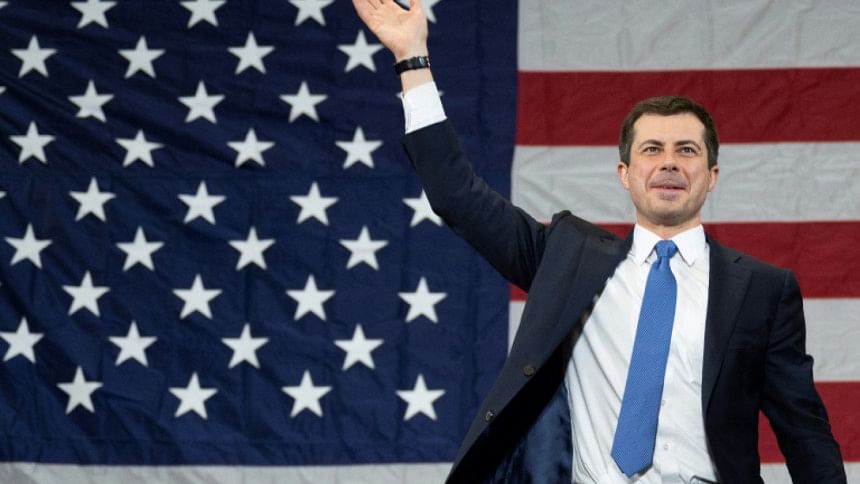Pete Buttigieg drops out of US presidential race

Pete Buttigieg closed his presidential campaign much the same way he started it: with a reminder he began with just four staff, a big idea and an unknown -- and unpronounceable -- last name.
"We were never supposed to get anywhere at all," he said Saturday to a cheering crowd in South Bend, Indiana, his hometown of 100,000 where he served as mayor for eight years.
Buttigieg, the first openly gay US presidential candidate, was a surprise hit in a race where favourites Bernie Sanders and Joe Biden are both more than 70 years old.
At 38 years old -- just three years older than the minimum age to be president -- "Mayor Pete" is driven by a self-confidence that could seem excessive, even arrogant.
But he finished in the top four in each of the first four state primaries and caucuses -- before bowing out as his chances of overall victory faded away.
Faith in his destiny is not new: Buttigieg recalls raising his hand in high school when a teacher asked who would like to be president.
"I don't know what it is we expect, that somebody kind of gets struck by lightning and then they turn into somebody who might become president," he said in a New York Times interview.
Although he didn't make it this time, he certainly made his mark.
His success "proved that Americans really are hungry for a new kind of politics rooted in the values that we share," he said, as his supporters in South Bend looked ahead by chanting, "2024!"
A former soldier
Peter Paul Montgomery Buttigieg was born on January 19, 1982 in South Bend, to parents who were both English professors at Notre Dame University.
His father, a specialist in the Marxist philosopher Antonio Gramsci, was a Maltese immigrant who came to the US for his PhD, where he met Pete's mother.
An only child, Pete grew up excelling in school. His path was typical of top students: he was accepted at Harvard, headed on to Oxford in 2005 on a prestigious Rhodes scholarship, and was recruited in 2007 by the elite McKinsey management consultancy.
"Nothing particularly sizzling," Buttigieg said of his time at the consulting firm.
At 25 years old, politics brought him home to South Bend. He ran for treasurer of Indiana but was defeated. But in 2011, the mayor's office opened up, and he was elected.
A Navy reservist for several years, Mayor Pete put his mayoral duties on hold in 2014 and spent seven months in Afghanistan, where he worked as an intelligence analyst.
When asked if he joined the military to boost his political career, he admitted to the podcast The Daily that he has asked himself the same question.
"If the answer is yes, does that mean the service wasn't pure in some way?" he asked rhetorically.
Former Republicans
But all those years, Buttigieg lived with a deep secret: he is gay. "If you had offered me a pill to make me straight, I would have swallowed it before you had time to give me a sip of water," he admitted last year.
He didn't come out until 2015, before he was re-elected as mayor. He met Chasten Glezman, a "guy who took a chance on a first date with somebody all the way in South Bend, Indiana and never looked back," Buttigieg told the cheering crowd as he suspended his campaign.
The couple married in 2018, and Chasten took his husband's last name. They have said they want children.
He has cultivated an image of a Midwestern man: traditional, devout (he was baptised Catholic but attends an Episcopalian church). The comedy show Saturday Night Live has parodied him as shy and boring.
He irked his rivals with his grand phrases such as "we've got to fix the engine of our democracy," and by his plans to reform the Constitution and the Supreme Court.
Critics pointed out that he struggled to garner support among black voters.
And on Saturday, Buttigieg came a distant fourth place in the South Carolina primary, with eight percent of the vote.
"Our goal has always been to help unify Americans to defeat Donald Trump," he said Sunday night.
When he officially announced his candidacy in April 2019, Buttigieg said he recognized the "audacity" of his White House bid -- a clear reference to Barack Obama's signature phrase "the audacity of hope."
It's true that the Obama camp soon took notice of the young mayor with sharp, clean sentences and a baritone voice.
Not long after Trump's victory, Obama was asked by The New Yorker about the Democratic succession.
Obama mentioned senators Tim Kaine and Kamala Harris, but then added: "And then there's that guy in South Bend, Indiana. The mayor."
But he couldn't remember his name.

 For all latest news, follow The Daily Star's Google News channel.
For all latest news, follow The Daily Star's Google News channel. 



Comments